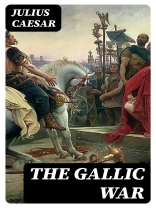In ‘The Gallic War, ‘ Julius Caesar offers a firsthand account of his campaigns against the Gallic tribes from 58 to 50 BCE. Presented in a clear and direct prose style, the work combines historical narrative with insightful commentary on military strategy and the socio-political landscape of ancient Gaul. Caesar’s writings are not only a record of his military exploits but also a reflection of his political motives, showcasing his ambition and skill in both leadership and rhetoric. The text is emblematic of the historical literary tradition of the late Roman Republic, blending a documentary approach with the persuasive techniques characteristic of Roman oratory. Julius Caesar, a military general and statesman, played an instrumental role in the transformation of the Roman Republic to the Imperial era. His experiences in Gaul provided him with deep insights into both military tactics and the complexities of local governance, contextually enriching his narrative. Given his dual role as both general and author, the text reveals his understanding of the power of narrative as a political tool, ingraining his legacy in Roman and world history. ‘The Gallic War’ is a must-read for anyone interested in military history, political strategy, or the classical world. Caesar’s lucid and compelling narrative transports readers to the front lines of conflict and illuminates the interplay between warfare and governance. This work not only serves as a historical document but also invites readers to ponder the lasting implications of leadership and authority.
Mengenai Pengarang
Gaius Julius Caesar (100–44 BCE) was a Roman general, statesman, and celebrated author of Latin prose. His most renowned work, ‘Commentarii de Bello Gallico’ (The Gallic War), provides a detailed account of the seven years he spent fighting local tribes in Gaul from 58 BCE to 50 BCE. This autobiographical narrative was written in third person, a stylistic choice which, along with its clear and elegant language, has made it a staple in the study of Latin literature. Caesar’s incisive reports cover not only military campaigns but also offer insights into the geography, social structures, and customs of Gallia and Britannia. The work is both a significant historical source for the period and a masterpiece of political propaganda, showcasing Caesar’s military prowess and his justification for the Gallic conquest. Caesar’s writings are characterized by their simplicity, clarity, and efficiency—a reflection of his military genius. They have remained a key educational tool for Latin students and a vital resource for historians of the ancient world. His contributions to literature are overshadowed by his political career, but they remain an essential part of his legacy, securing his reputation not only as a powerful leader but also as a significant Roman author.












